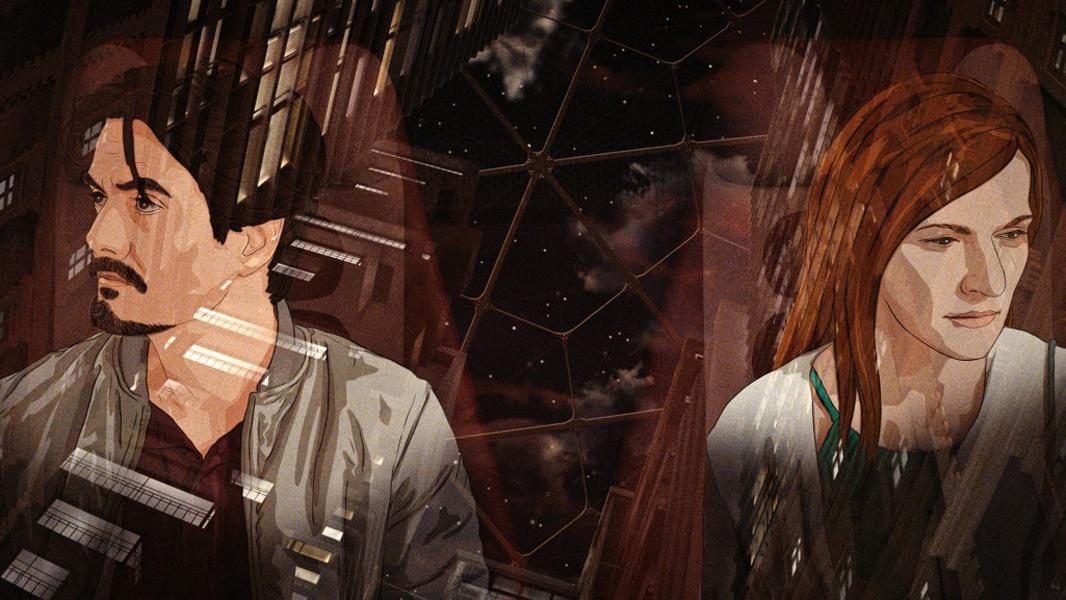There are no trees in Budapest in the year 2123 to go by the future presented in “White Plastic Sky,” only holograms that come up with the sun when the earth has become inhospitable to all forms of life, shedding itself of plant and animal life and would’ve rid itself of humans as well, if not for the craftiness of a scientist named Paulik, who understood that humans could save themselves with the resources endemic to their biological makeup by giving life to trees from their own bodies. The only catch is that there’s a mandatory end to life at 50, and people can volunteer to sacrifice themselves even earlier for the greater good, evacuated from the realm of a more civilized society to the Plantation where bodies are used for growing the shrubbery necessary for oxygen below.
You can understand why Tibor Bánóczki & Sarolta Szabó wanted to pursue the sci-fi tale in the animated rotoscope process most closely associated with Richard Linklater in such films as “Waking Life” and “A Scanner Darkly” when it likely would’ve been impossible to pull off otherwise as a budgetary matter, but like Linklater, they ultimately use it for an intimate-scale drama involving a couple for whom the future looks bleaker than the past. Although Stefan (Tamás Keresztes) and Nora (Zsófia Szamosi) survived the apocalypse, they have had trouble in the new world when their young son Tomi died, leading Nora to apply for an early exit from her current life to be of assistance at the Plantation. She hasn’t told Stefan, deciding to wait until a dinner at an Alinea-esque restaurant – without water, molecular gastronomy is more of a necessity than a novelty – and being the night before she’s set to leave, he has little recourse to prevent her departure.
While the relationship between Stefan and Nora is engrossing enough to lose sight of all the world building that Bánóczki and Szabó have done, “White Plastic Sky” nonetheless impresses in how the two have been shaped by their circumstances, imagining an antiseptic, dome-covered society on stilts that may have put humanity out of reach from immediate threats but has locked in a lack of consideration for others when individual survival has become paramount. Ironically, Stefan has a fascinating position in this new world order, serving as a psychologist often asked to talk others through the impending grief of parting with a loved one and although the film doesn’t spend much time at his practice, he faces an intriguing conundrum after learning of Nora’s decision, resisting the advice he’d usually give to patients.
Leveraging his profession to find his way into the Plantation in an official capacity, Stefan may devise a clever plan to rescue Nora from donating her body to science, but has a far harder time pulling her out of her grief, particularly when his own is somewhat unresolved. In spite of all the elemental obstacles the two encounter as they navigate unknown territory together on the Plantation and beyond, seeing eye to eye again may be the most difficult to pull off. However, it seems possible when Bánóczki and Szabó are able to allow one to look past all that’s foreign about the future they present in “White Plastic Sky” to find an intensely relatable core with a couple at a crossroads where no amount of science can reconcile the vast number of emotional variables. Set in a time when humans appear to have little more to contribute to the earth’s sustainability than their bodies, the film sees Stefan and Nora have plenty more to offer and in doing so, “White Plastic Sky” proves to be far more than the sum of its parts.
“White Plastic Sky” will screen at Berlinale on February 18th at 9:30 pm at Cubix 9, February 19th at 10:30 am at Cubix 5 and February 25th at 1 pm at Akademie der Kunste.




